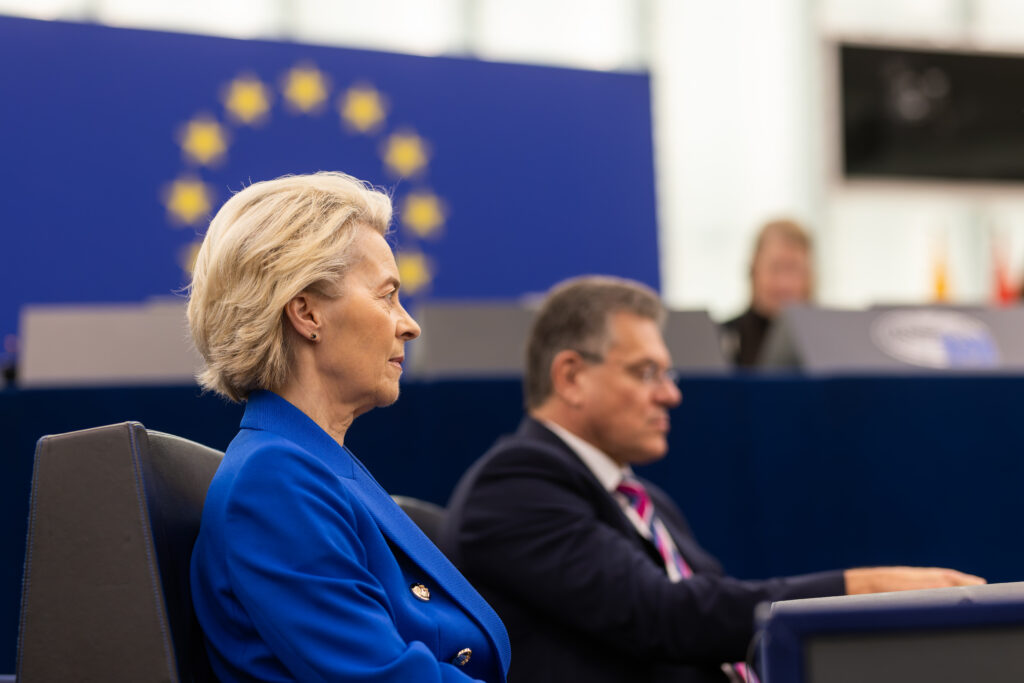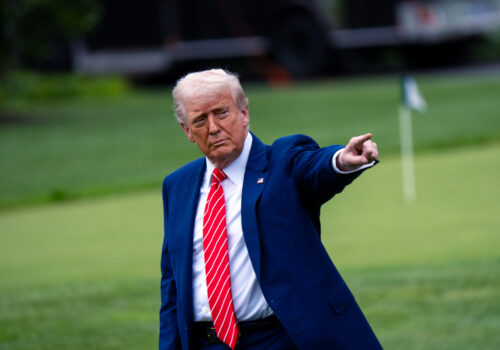The United States and European Union (EU) seem finally to be entering into serious negotiations on trade and the tariffs imposed by the Trump administration. For months, each party has accused the other of being too vague in its proposals. This culminated on May 23 in US President Donald Trump’s threat to raise tariffs on the EU to 50 percent by June 1. Although he later paused that increase until July 9 to allow for negotiations, it’s not yet clear that those talks will succeed. Meanwhile, the EU has made clear that if the talks fail, then it is prepared to retaliate. Yet retaliation will only heighten tensions between Brussels and Washington, and it will not lead to a deal or serve longer-term EU interests.
A deadline and no deal
Although trade talks are now underway, the United States and the EU do not seem to agree on the scope of those talks or their objectives. The European Commission continues to push for mutual reductions in tariffs on industrial goods, as well as for the United States and the EU to address global overcapacity in steel, aluminum, and autos, as well as dependence on China for critical minerals. The European Commission is willing to offer the facilitation of increased purchases of US liquefied natural gas, but it maintains that the 10 percent baseline tariff—imposed by the United States on April 2—is not acceptable.
For its part, the Trump administration has focused intently on measures that would reduce the EU’s trade surplus in goods. But it has also been clear that it is seeking regulatory relief for US companies from key EU legislation and taxes, especially in the digital and sustainability sectors. The EU appears to regard this position as a nonstarter. Adding to the uncertainty about the goals of the talks, the US Court of International Trade (CIT) ruled on May 28 that the 10 percent baseline tariffs were illegal, but a later appeals court ruling allowed the Trump administration to continue to impose the tariffs while the legal process plays out, perhaps at the US Supreme Court.
Thus, it is possible that July 9 will arrive without a deal. On that date, the US baseline tariffs for the EU are scheduled to double to 20 percent. (This assumes that the US CIT ruling is not in force, and that Trump does not revert to his threat of 50 percent tariffs.) These tariffs will apply to all EU exports to the United States and may be stacked on top of the 25 percent tariffs on steel and aluminum and the 25 percent tariffs on autos and auto parts.
The EU will then face a choice: retaliate with tariffs and other measures of its own or don’t. Even if the baseline tariffs are voided, the EU will want to address the sectoral tariffs, including potential new tariffs on pharmaceuticals, lumber, and semiconductors. Meanwhile, the United States will still seek concessions on the trade deficit and regulatory barriers.
At present, the consensus in Brussels seems to be that retaliation is the right course of action. The EU had already activated $23 billion worth of retaliatory measures on April 9 in response to the United States revoking the prior arrangement on steel and aluminum. That EU retaliation was then paused the next day in response to the US pause on “reciprocal” baseline tariffs. Since then, the EU has identified additional measures on roughly €100 billion in goods that could be imposed if the United States increases those tariffs to 20 percent in July. “We do not necessarily want to retaliate,” European Commission President Ursula von der Leyen said in April. “But if it is necessary, we have a strong plan to retaliate and we will use it,” she added. The European public seems to support this stance: a YouGov poll of six EU member states in March found between 79 percent and 56 percent of respondents supported retaliatory action.
Eight reasons to hold fire
But retaliation is unlikely to help the EU achieve its goals of a more stable and open trading partnership with the United States. It may be that this goal is not achievable, given Trump’s views on the EU and trade. But the more likely route to success depends on the EU pursuing its own interests, rather than responding tit-for-tat to an erratic US negotiating strategy. In the current environment, retaliation is unlikely to serve EU interests for the following reasons:
1. Retaliatory tariffs will hurt the EU economy
Just as the EU warned that US tariffs would hurt US importing companies and consumers, the imposition of tariffs on US exports to the EU is likely to raise prices inside the EU. This could further slow the EU’s economic growth, which is projected to be just 1.1 percent this year. It also risks reversing the EU’s recent success in lowering inflation. (The EU inflation rate has fallen from 2.7 percent in May 2024 to 2.2 percent in May 2025, and the eurozone rate has fallen from 2.6 percent to 1.9 percent over the same period.)
2. Tariffs will not support the EU’s top priority of building competitiveness and enhancing growth
Former European Central Bank President Mario Draghi, the author of the influential report on EU competitiveness published in September 2024, has cited International Monetary Fund data estimating that barriers to internal EU trade have the same effect on manufacturing as external tariffs set at 45 percent. Europe’s slow growth and lack of global competitiveness in many economic sectors has compromised its credibility in the United States, leading many to discount the EU’s importance as an economic partner. This is even despite data demonstrating its premier place among US economic relationships, not only in trade, but also in terms of mutual investment and revenues for US companies. For the EU to succeed at its competitiveness agenda, it must not risk adding more burdens, such as the cost of retaliation, to its economy.
3. The era of the World Trade Organization is over
Twenty years ago, retaliation was a way of encouraging the parties to come to the table. It was hoped that negotiations would lead to a solution that reduced barriers to trade. But the Trump administration rejects the value of a free and open trading system, and it appears to fundamentally disagree with the idea of mutual reduction of barriers. When US officials talk about bargaining leverage, they speak of leverage as pressuring others to make concessions to the United States, not to further open trade.
4. “Rebalancing” is no different from retaliation
Some EU officials maintain that the bloc will not retaliate but is merely seeking to “rebalance” to compensate for the cost of the tariffs on EU exporters. But this is a distinction without a real difference. It is unclear whether the ultimate US decision maker, Trump, would draw a distinction between retaliation and rebalancing. Even if he did, he also clearly believes that the EU’s goods trade surplus is unfair and illegitimate. If the EU claims it is rebalancing to compensate for steps the United States took to correct its deficit with Europe, Washington is unlikely to see it as anything other than an effort to maintain the existing trade imbalance.
5. Not all of Trump’s tariffs are negotiable
Trump has underscored that his tariffs have multiple aims. They create bargaining leverage, but they are also intended to help rebuild the US manufacturing base and finance tax cuts. The latter two goals require the administration to maintain its tariffs to achieve its aims. The US-UK trade agreement seems to indicate that the sectoral tariffs might be negotiable, but the baseline tariffs are not. But if the baseline tariffs are overturned by the courts, then it is likely that the administration will be even more determined to maintain—and perhaps even enhance—the sectoral tariffs, as happened with the increase in steel and aluminum tariffs to 50 percent threatened by Trump on June 4. Given that the legal challenge to the tariffs may well rise to the US Supreme Court, uncertainty could persist through the autumn, if not longer.
6. The EU is not the United Kingdom
Unlike Britain, whose trade across the Atlantic is fairly balanced—indeed, the United States enjoyed an $11.9 billion goods surplus in 2024—the EU had a $236 billion goods trade surplus with the United States last year. Moreover, the United Kingdom is a much smaller trading partner for the United States, so there are fewer consequences for letting British goods into the United States. In the recent UK-US deal, Washington and London agreed to allow 100,000 UK cars into the United States with a tariff rate of only 10 percent, rather than 25 percent. (For context, in 2024, the United Kingdom exported 101,000 cars to the United States.) If a similar arrangement were to be agreed with the EU, based on previous export levels, it would allow 750,000 autos into the US market.
Aside from these economic considerations, it seems that Trump does have a fondness for the United Kingdom that he lacks when it comes to the EU. Whether it is because of his British golf courses or admiration for the royal family, he is clearly more amenable to a deal with London than with Brussels. Not only is the EU far less likely to achieve a deal, but if it were to retaliate, these factors mean that movement toward a deal—which is the aim of retaliation—would still be very unlikely.
7. The EU is not China
China responded to Trump’s imposition of tariffs of at least 145 percent by immediately imposing a tariff of 125 percent on US goods. When the result was an almost total stoppage of US-China trade, the parties agreed to begin talks, and the tariffs were quickly reduced to 10 percent on US goods to China and 30 percent on Chinese goods to the United States while negotiations began. Some in Europe believe the strong Chinese response brought the US government to the negotiating table, although it is also clear that Trump wants a deal with China more than he does with the EU. In any event, the EU is unlikely to be able to respond as China did, either in terms of swiftness or acuteness of response. Nor is its response likely to lead to a stoppage of transatlantic trade. Perhaps most importantly, the EU lacks any leverage over the US supply of critical minerals, while US dependence on China for these materials is very real.
As for process, while the Chinese government can increase tariff rates overnight and with little regard for legal or democratic processes, the EU must gain agreement among twenty-seven member states and follow an established regulatory process. The European Commission has prepared a substantial list for retaliation, but member states will undoubtedly trim the list as the time for a decision nears. Even if mostly implemented, that list is unlikely to shut down transatlantic trade in the same way as did China. Instead, EU retaliation is likely to seem much more gradual and much less consequential. It’s likely, for instance, to have less of an impact on financial markets. Whether it will make the Trump administration willing to engage in the mutual tariff reductions desired by the EU is more hope than expectation.
8. The EU should not give Trump a rationale for blaming Europe for any downturn in the US economy
Especially if the United States makes a deal with China, but the economy worsens before the 2026 midterm elections, Trump will likely look for someone to blame. He has made no secret of his dislike of the EU, and his criticism of the bloc is already proving popular among his supporters, especially in the Republican hierarchy. A Europe that retaliates is more likely to find itself a target in American arguments about a stalling US economy.
***
The European Union will soon face a major choice in its relationship with the United States and the Trump administration. Retaliation—even if justified—is likely to escalate the situation with uncertain consequences. Some will argue that to choose no retaliation will damage the EU’s credibility, not only with the US administration, but also in the many other trade negotiations Europe currently has underway. But that depends on how Europe explains its lack of retaliation. If it cites the arbitrariness of the US administration and declares its commitment to pursuing mutually beneficial negotiations with others, there may be little cost. After all, other countries are also trying to manage relations with the unpredictable Trump administration. Some, such as Mexico and Japan, have studiously sought to avoid escalation. Perhaps most importantly, not escalating a trade war with the United States—and even being prepared to walk away from further talks—will let Europe focus on its real priority: building a competitive, world-leading economy.
Frances G. Burwell is a distinguished fellow at the Atlantic Council’s Europe Center.
Further reading
Fri, May 30, 2025
Experts react: How the world is responding to the courtroom drama around Trump’s tariffs
New Atlanticist By
Several recent court rulings have complicated the US president's plans to impose sweeping tariffs—and US trading partners are watching.
Fri, Jun 6, 2025
Even as courts step in, Trump still has plenty of tariff options. US trading partners should intensify negotiations.
New Atlanticist By
Section 301 may entail more work for the White House, but it could provide a relatively straightforward pathway to broad-based tariffs.
Tue, Jun 10, 2025
Five questions (and expert answers) about the new EU sanctions plan for Nord Stream and Russian banks and oil
New Atlanticist By
Atlantic Council experts break down the details of the European Commission's proposed eighteenth sanctions package against Russia for its war on Ukraine.
Image: Maros Sefcovic (r, non-party), European Commissioner for Trade and Economic Security and Commissioner for Institutional Relations and Transparency, and Ursula von der Leyen (CDU), President of the European Commission, sit in the plenary chamber of the European Parliament. Wednesday is to begin with a debate on the upcoming EU summit on Thursday. Also on the agenda is a vote on disinformation on the internet and a debate on allegations of corruption in the EU. REUTERS




